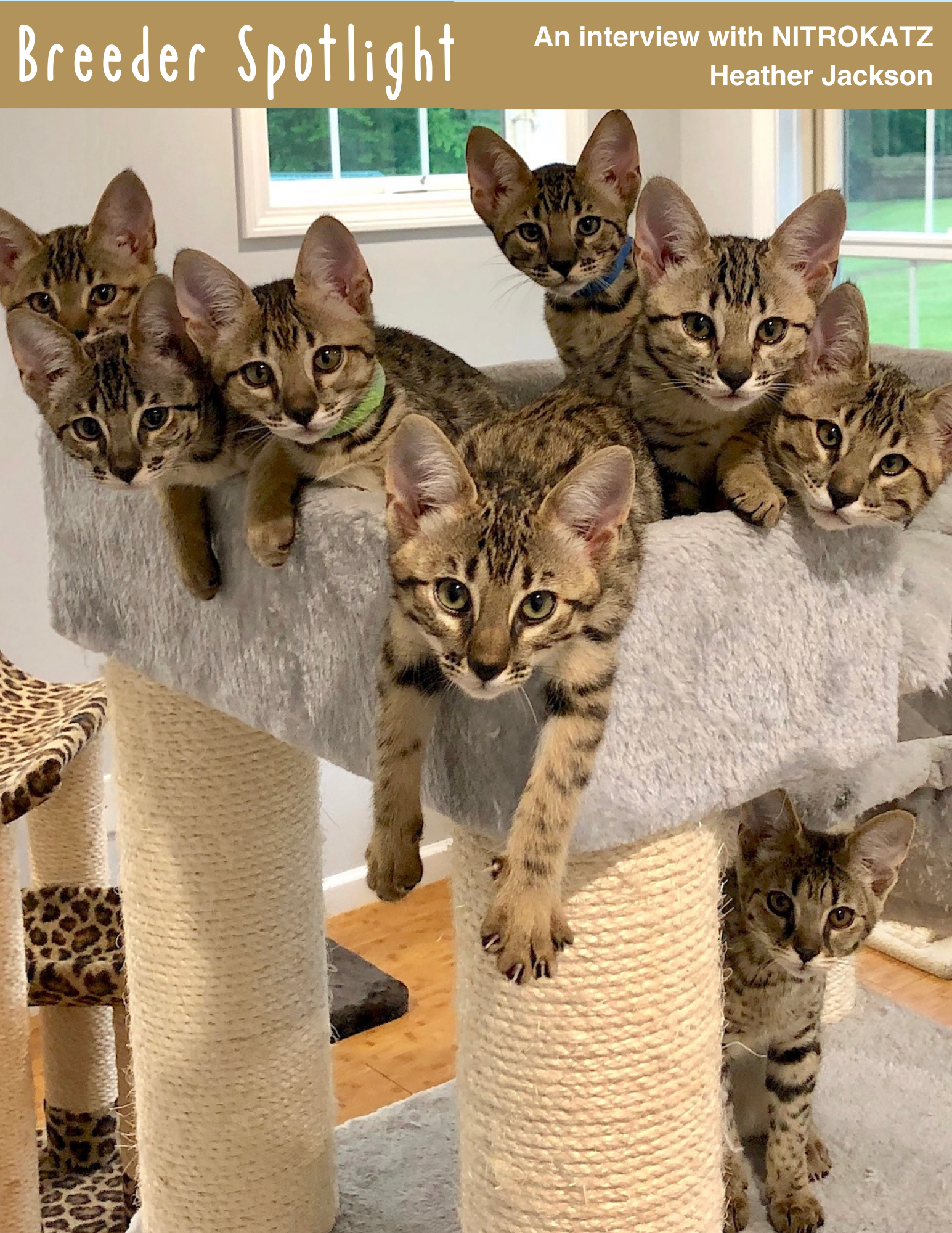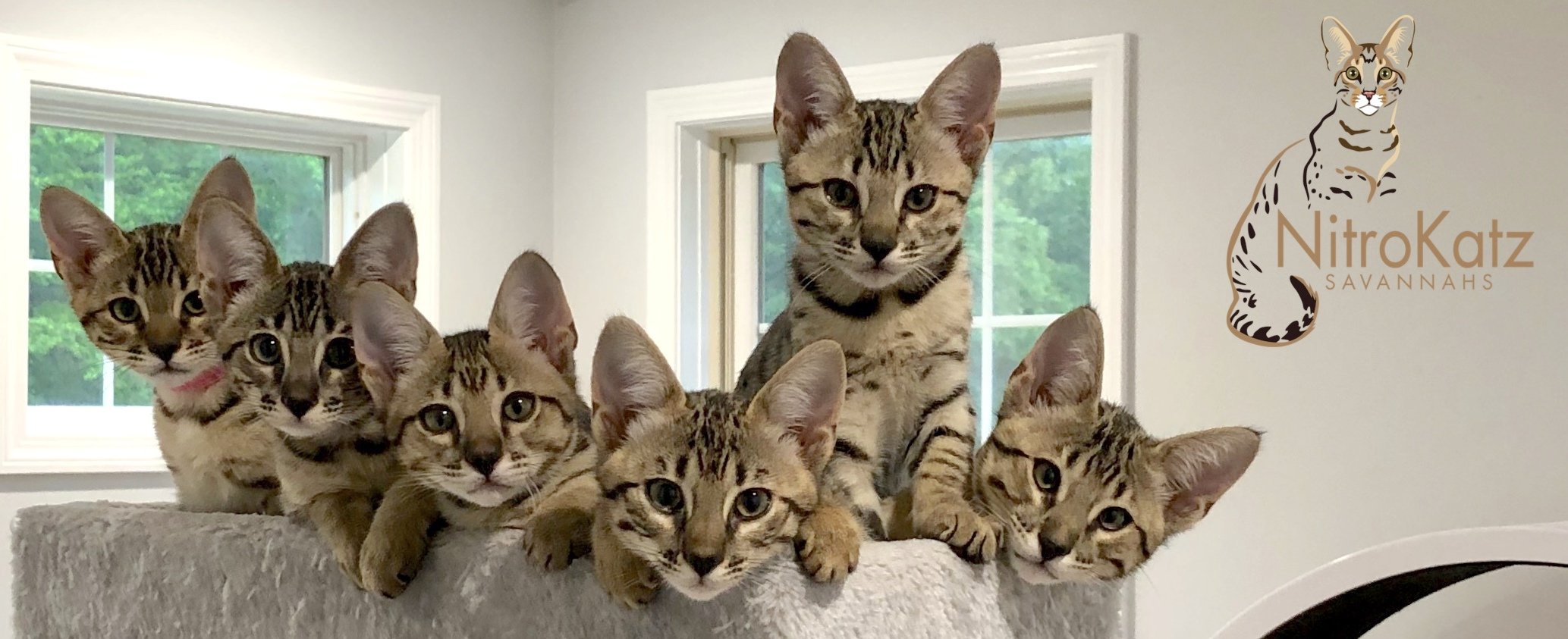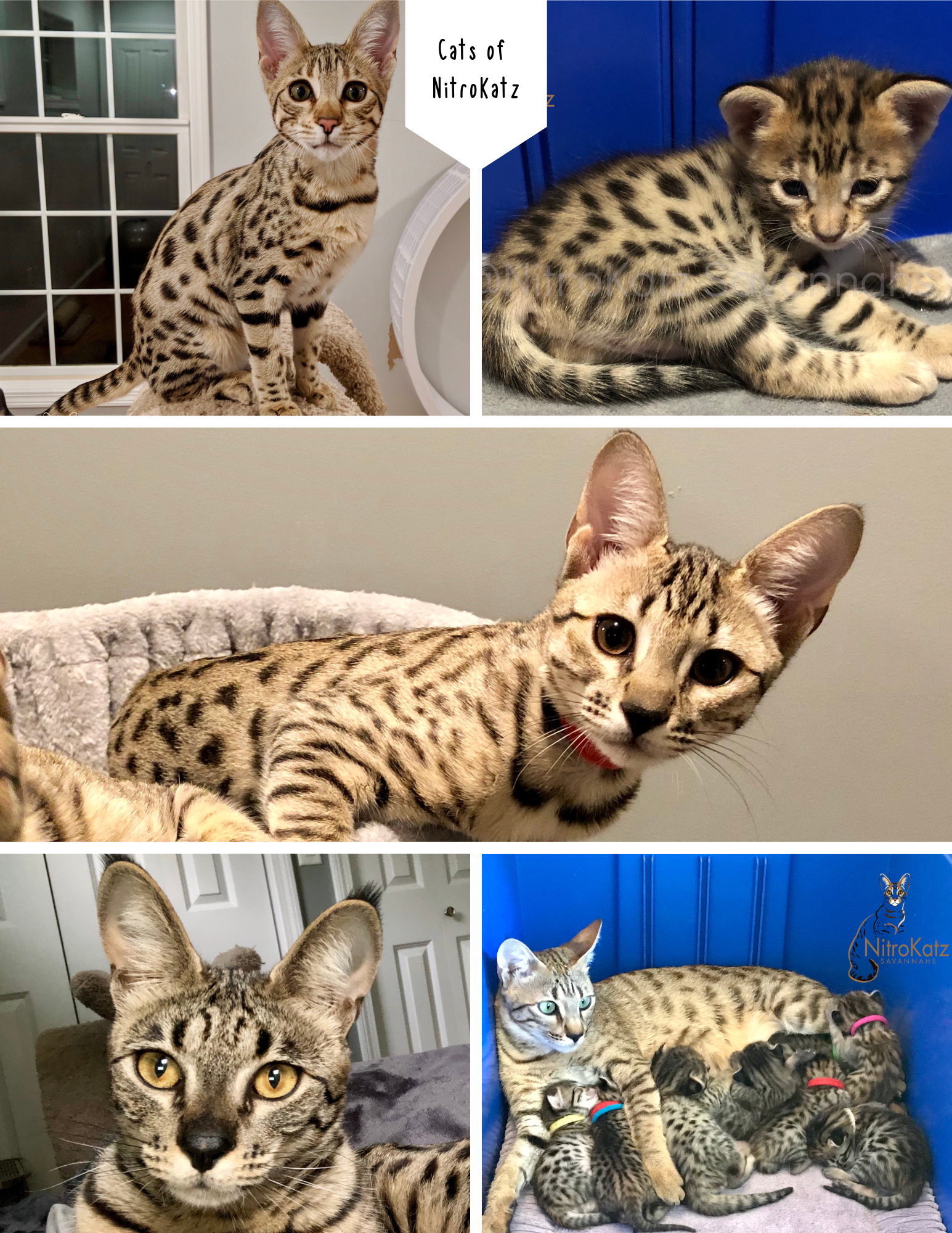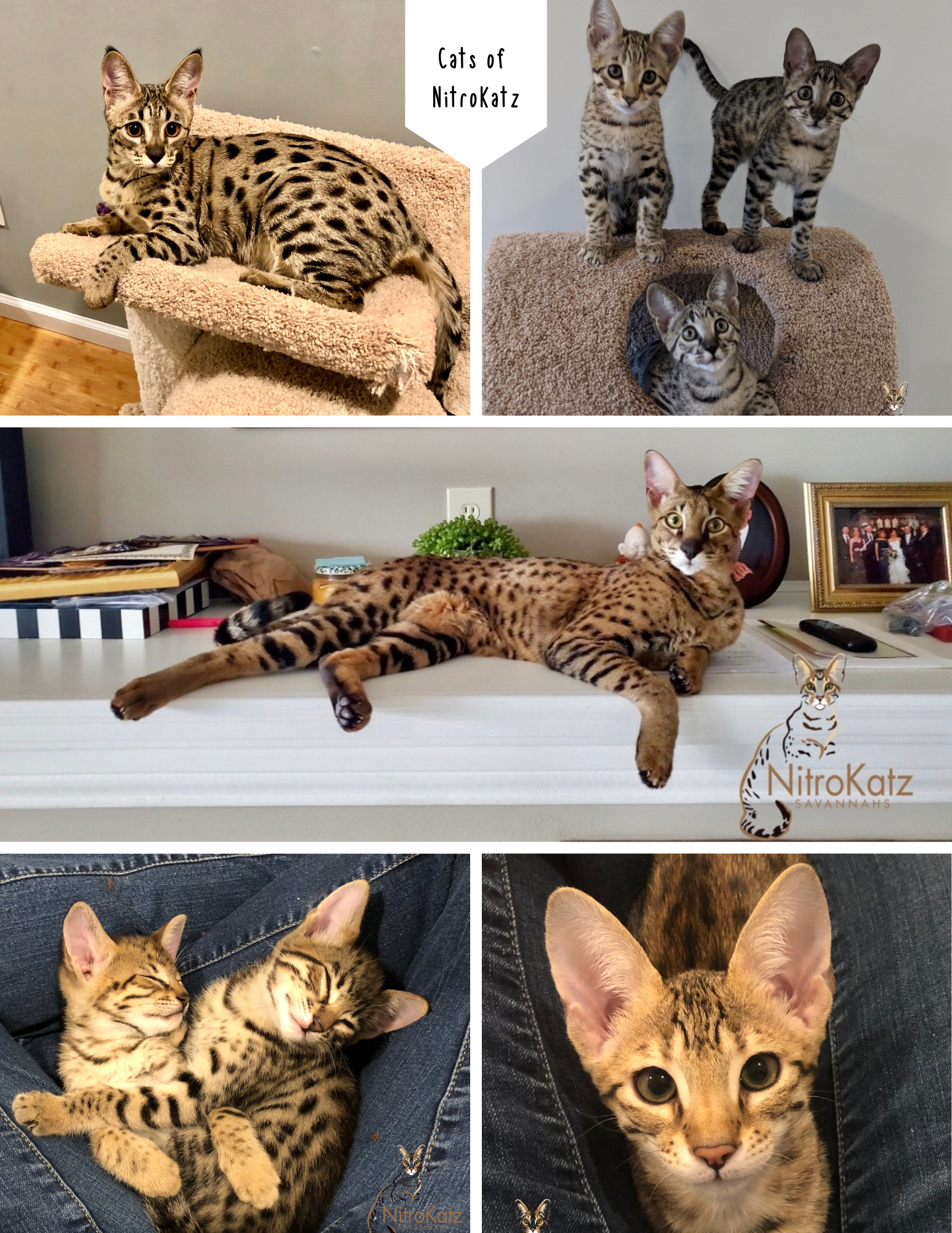SAVANNAHGANS® Interview With Heather Jackson of NITROKATZ
What inspired you to start breeding Savannahs?
My Savannah obsession began in 2013. I've had cats most of my life. We had a very special Bengal as a pet for many years and lost him to renal failure. We wanted another "special" cat but knew another Bengal could never be the same. And at that time, Savannah's were illegal in our state. As soon as we learned Savannahs became legal here, we set out to find our first Savannah, a later-generation boy. We also got his sister for the company, knowing our elderly DSH would NOT appreciate their company. (And we were right.) Not long after we got them, we also wanted an early-generation Savannah. We found our perfect F2 boy and brought him home.
After falling in love with this magnificent creature, we realized there were significant variations in Savannah's quality from different breeders. We started thinking about becoming breeders to share these beautiful cats with others and focus on producing the best Savannahs. We researched the best breeders and decided what generations we were interested in producing. Then we found our perfect stud and got our first queen. My cattery is a VERY small in-home, hobby cattery (we can count our current breeding cats on the one hand), and we focus on quality - not quantity. We're fortunate to have cats from some of the country's best breeders and worldwide. And I have many other breeders who've helped us get this far. I enjoy helping the Savannah community and giving back where I can. And although I don't get the opportunity to do it enough, I enjoy participating in TICA shows and sharing our magnificent breed with the public.
How'd you come up with the cattery name "NitroKatz"?
Naming a cattery was such a hard decision. I went through many and didn't like any for various reasons. Once my founding stud was home, and I decided on a name for him, the cattery name was easy. People who know how we came up with our cattery name then ask how we came up with his name! That boy's name is Nitro; hence, "NitroKatz Savannahs" was born.
How'd you come up with the name "Nitro"?
"Nitro" is named for the supercharged purr I heard the first time I met him. It sounded like a blower car running on Nitro-methane, hence his name. And the fact that he goes 200 mph when playing!
Have you bred any other type of cat or animal?
Nope, Savannahs are our first breeding endeavor and my first animal passion.
Do you recommend people try to breed Savannahs? Why/Why not?
First, I ask WHY they want to breed Savannahs. Unless their answer is "for the betterment of the breed," AND they can explain what they mean, I wouldn't encourage them to start breeding. When people say they "want to breed Savannahs," I always tell them not to put any money into it they can't afford to lose. There are NO guarantees in breeding any animal, but breeding Savannahs is even more complicated than other animals.
What's the best tip or advice you've received from another breeder?
Start your cattery by first buying your stud before any queens. Starting with high-quality cats will help start you out on the right foot. Only buy the VERY best stud (and all your cats) you can afford.
What's the best part about breeding?
The best part of breeding, by far, is seeing the happiness our kitties bring their new families! It's especially fun when it's their first Savannah (and you know it won't be their last)!
Usually, breeding cats can't live freely as pets in the house without ruining your home. Some intact females can live together in harmony, but most cannot. And both males AND females will spray; sometimes, the girls are worse than the boys. However, the boys do smell much, much worse. Studs and queens need to be separated to control breeding. Boys can start spraying and be fertile as early as 4-5 months old, and females can start cycling and get pregnant around four months old. Build your cat's living quarters before bringing them into your home/cattery.
What's the worst/most challenging part about breeding?
The most challenging part about breeding is dealing with kitten loss, ranging from an entire unborn litter, a newborn kitten with its wings, or one living with a new family.
What's the biggest weakness of the Savannah breed?
Too many breeders choose a "black nose" over a good Savannah breed type. One of these days, I will photograph a pink-nosed cat and post it. Using the same photo, I'll Photoshop in a black nose and post it to see the difference in responses. I often see many comments like "How stunning!" on pictures of a black-nosed Savannah; that's a poor example of the breed, yet it gets viewed as "perfect" because of the black nose.
What's the biggest strength of the Savannah breed?
One of Savannah's biggest strengths would be the breed's overall healthiness because it is so new. With that said, it's incredibly essential for breeders to be responsible and do all pertinent health testing possible on their cats. Also, remove any cats with health issues or pairings that produce multiple health issues from their breeding program.
What's the most important thing a breeder does?
This is a tough question because there are SO many different areas to get right. But, I think the most important thing a breeder can do is everything in their power to ensure their cats and kittens are as healthy as possible.
What should new breeders know about breeding they probably haven't considered?
Usually, breeding cats can't live freely as pets in the house without ruining your home. Some intact females can live together in harmony, but most cannot. And both males AND females will spray; sometimes, the girls are worse than the boys. However, the boys do smell much, much worse. Studs and queens need to be separated to control breeding. Boys can start spraying and be fertile as early as 4-5 months old, and females can start cycling and get pregnant around four months old. Build your cat's living quarters before bringing them into your home/cattery.
What's a typical day/routine at your cattery?
I work 60+ hours a week full-time to support my family and my hobby. On days I'm not working from home, I wake at the crack of dawn to clean up any messes made overnight, feed everyone, clean litter boxes, and give them some attention. I then prepare myself for work and clean up the messes I made since I cleaned up earlier. When I get home, I quickly check everyone, with a bit of attention, and clean-up up any major messes I see (notice a theme here?) Then, I make everyone's meals for dinner and breakfast the following morning so that I can catch a few extra minutes of sleep. I work my way through everyone, giving them dinner, cleaning litter boxes, giving lots of attention, and hosing down the cattery. I then tend to emails (for work and the cattery) and cattery messages/paperwork. Then, I spend more time with the kitties until it's time for bed. While trying to fall asleep, I respond to more emails if I don't finish earlier. (Oh, and before bed, one last check for any messes.)
We've been raw feeding since we got our first Savannahs. Our cats are almost exclusively raw-fed, but we give some canned food here and there. I spend my time helping educate our kitty families (and anyone else needing help) and starting with raw diets. And, of course, offer advice along the way if they encounter any issues.
Who tends to your cattery when you travel for a weekend or vacation?
What's this "vacation" thing you speak of? I thought those were only in fairy tales! Kidding aside, we haven't taken a vacation in the six years we've been breeding. I don't mind, though, since I'm away from home for work (although not as much as I was when we started our cattery). So, vacation to me is spending a whole week sleeping in my bed. The last thing I want to (or can) do is travel on weekends or for a week of vacation. If I need to be gone a couple of days for a cat show or something, I must arrange for my pet sitter to come.
Do you raw feed your cats?
We've been raw feeding since we got our first Savannahs. Our cats are almost exclusively raw-fed, but we give some canned food here and there. I spend my time helping educate our kitty families (and anyone else needing help) and starting with raw diets. And, of course, offer advice if they encounter any issues.
What do you think about the phasing out of F1 Savannahs?
A Committee is in place to fight the standing rule against registering new Exotics for use in TICA Breeding programs as of September 21st. They presented new wording to rescind and revise that rule. The TICA board of directors will vote at the next board meeting. If it passes, then it will be voted on by TICA members. I hope this passes, as I can't imagine our breed not bringing in any new Servals at this point in development.
What about phasing out F2s and F3s?
On top of everything else, I'd personally miss my early-generation Savannahs. They're definitely like no other in purrsonality and intensity.
Who tends to your cattery when you travel for a weekend or vacation?
What's this "vacation" thing you speak of? I thought those were only in fairy tales! Kidding aside, we haven't taken a vacation in the six years we've been breeding. I don't mind, though, since I'm away from home for work (although not as much as I was when we started our cattery). So, vacation to me is spending a whole week sleeping in my bed. The last thing I want to (or can) do is travel on weekends or for a week of vacation. If I need to be gone a couple of days for a cat show or something, I must arrange for my pet sitter to come.
You mentioned you work 60 hours a week at your job. What do you do for a living, and can you primarily work from home?
I work for a major medical manufacturer. My primary role is traveling throughout my corner of the country, training people to use our medical imaging equipment for my specific modality. I have a secondary role in managing our call center (and staffing it sometimes) and teaching people to work our call center and do other parts of our job remotely. My job is a varied schedule based on company and customer needs. My job varies between working from home (longer than an eight-hour shift due to compliance "paperwork"), traveling out of state for four to five days, or any schedule between those.
What else would you like the Savannah world to know about you and your cattery?
NitroKatz is located in Connecticut and is a TICA-registered hobby breeder of guaranteed healthy, happy, stunning, and pre-spoiled Savannah kittens! NitroKatz produces the highest quality F2B, F3C, and F7SBT Savannah kittens. NitroKatz's breeding philosophy mirrors many catteries, breeding for HEALTH, TEMPERAMENT, and TYPE. All cats are fully tested when joining and regularly. They are fed the best raw diet with supplements and given lots of toys, playtime, and other enrichment to ensure every kitten has a healthy start in life. Every kitten comes with a full written HEALTH guarantee. All the cats are pets first and foremost, so only those with the best TEMPERAMENT are kept in the breeding program. This guarantees the new kitten comes with a great TEMPERAMENT through genetics and socialization. Our breeding cats are hand-selected to have outstanding and complementary TYPE from some of the best Savannah breeders in the world. This promises every new kitten represents a stunning example of the breed and will possess many traits of the Savannah Breed Standard.
Above all else, I'm an ethical animal lover, and my cats come first, no questions asked. We might be a small cattery compared to most, and we don't have a fancy professional website or take professional pictures. But we put everything we have into our cattery, and I think we've produced some outstanding Savannahs.
BEFORE YOU GO, WE NEED YOUR HELP TO MOVE UP THE RANKS ON GOOGLE!
Help SAVANNAHGANS® Grow and Reach Every Savannah Cat-Owning Household! All support is humbly appreciated (visit the clickable underlined links).
Subscribe (free) HERE
Share this article on your social media platforms.
Leave a Comment. (this is VERY helpful to our growth and Google recognition)
Follow on Instagram.
Follow on Pinterest.






